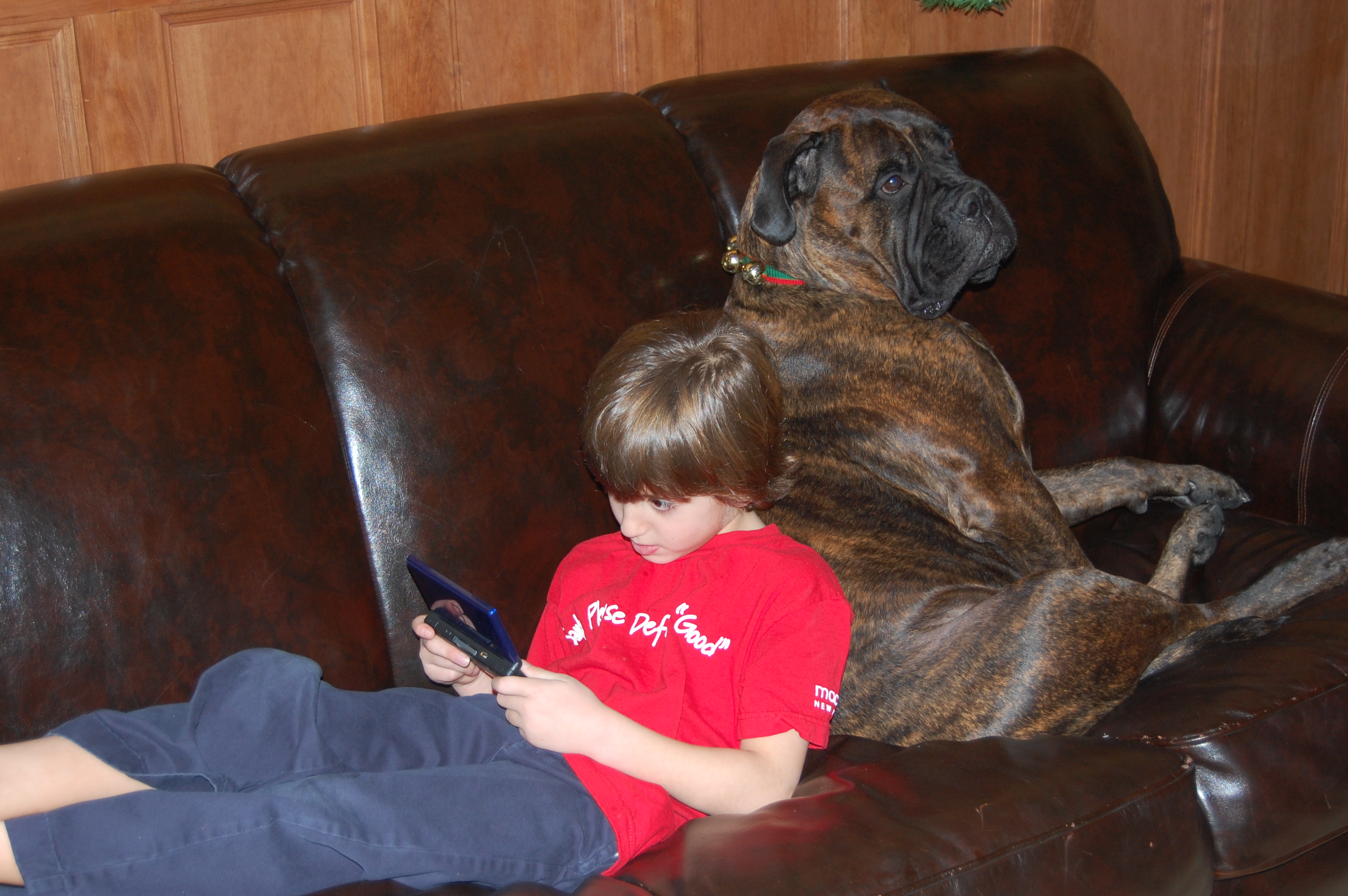Dogs' lives are too short. Their only fault, really. -- Agnes Sligh Turnball
Our dog Lily died today. HuffPost readers may remember her, as she was featured in a blog I wrote last year about the concept of canine-assisted therapy. She was a therapy dog who visited hospitals, nursing homes, schools for children with learning disabilities and even a juvenile correction center. She was a working dog, a 120-pound bullmastiff who was kind, goofy, as gentle as a lamb, and a beloved member of our family.

Ironically, the most popular therapy dog at Memorial Sloan Kettering Cancer Center succumbed to lymph node cancer. She was only 7 years old. She is survived by my wife and Lily's therapy partner, Valerie, our two children (Lily's human siblings) and me. I can't begin to describe the sorrow and grief that I am feeling right now. More importantly, how can I help my wife and children cope?
For starters, it is important to comprehend the five stages of grief.
Denial: "This can't be happening to me."
Anger: "Why is this happening? Who is to blame?"
Bargaining: "Make this not happen, and in return I will ____."
Depression: "I'm too sad to do anything."
Acceptance: "I'm at peace with what happened."
It is necessary to experience and deal with each stage. It is especially important to recognize and channel the anger phase. Do not deny or hide it, express it. Cry, yell, scream, or whatever it takes to allow the anger to dissipate and permit you to grieve and eventually accept the loss.
Grieving is a process without a predetermined time frame. The level of grief depends on several factors, including your age and personality, age of the pet, and the circumstances of the pet's death. Some people take longer than others. Often, single pet owners who live alone take longer to grieve because their dog or cat played such a large role in their lives. The same is true for disabled people who lose their therapy- or seeing-eye dog, because the animal was a companion and a vital enabler.
Grief can be a confusing experience for children. The death of a pet is often the first time children are subjected to such sorrow. Our kids literally grew up with Lily, but our youngest son Luca could not understand why he was unable to cry when Lily first died. I explained to him that we all grieve differently, while he may not cry now, it may happen tomorrow, or much later, and that is OK. Experts say that kids usually react to the way parents behave in many situations, and grieving is a good example. If parents react irrationally or dramatically during the grieving process, children mimic that response. Adults should not hide their emotions either. It is normal for a man to cry, for instance, and kids must understand that. Repressed emotions can be extremely unhealthy.
If possible, allow your children to say goodbye. If euthanasia is necessary, be honest, don't tell them that the pet went to sleep or went away, as that will cause confusion and resentment when they do fully understand. Explain the circumstances and try to get them to talk about it and ask questions. Create a memento, a photo or paw print for them to have forever, but especially during the grieving process. Don't rush to replace the pet right away; allow your child to finish grieving.
Psychologists also often offer these recommendations.
- Don't let anyone tell you how you feel. Many friends are not "pet people" and do not understand or appreciate your angst. Avoid those friends for a while.
- Reach out to those people who have pets or to those who have experienced loss of a beloved dog or cat for consolation and company.
- Rituals help healing. Have a memorial service or funeral to honor your pet and allow you to work toward closure.
- Create a legacy. Plant a tree or donate to an animal shelter or vet school in the name of your deceased pet.
- Look after yourself. The grieving process is exhausting. Try to eat in a healthy fashion, drink lots of water (crying is dehydrating!), exercise and watch the alcohol intake. Treat the grieving process like a marathon, and stay healthy to finish.
- Maintain an active schedule. Replace time normally spent with your pet with other activities to keep you busy to avoid depression. Volunteer at a hospital or nursing home. When you are ready, volunteer at an animal shelter or ask to walk a friend's dog on occasion. Stay busy!
I am certain that many of you have lost a beloved pet. Please write in and share your ideas and recommendations for dealing with the death of your pet.
Just researching and writing this blog has been extremely helpful for me to deal with the loss of our Lily. Just the same, please excuse me while I have a good long cry. Farewell my girl.
For more by Robert Tornambe, M.D., click here.
For more on death and dying, click here.
?
?
?
Follow Robert Tornambe, M.D. on Twitter: www.twitter.com/RobertMTornambe
"; var coords = [-5, -72]; // display fb-bubble FloatingPrompt.embed(this, html, undefined, 'top', {fp_intersects:1, timeout_remove:2000,ignore_arrow: true, width:236, add_xy:coords, class_name: 'clear-overlay'}); });
kourtney kardashian kourtney kardashian lipitor lipitor kourtney kardashian pregnant again kourtney kardashian pregnant again apple juice
No comments:
Post a Comment
Note: Only a member of this blog may post a comment.